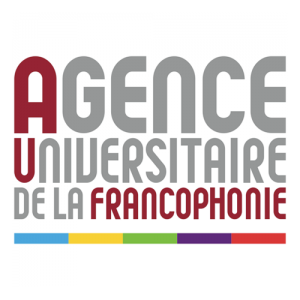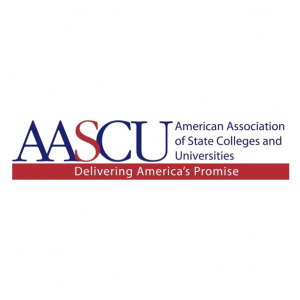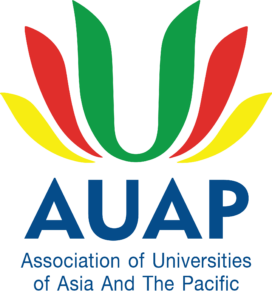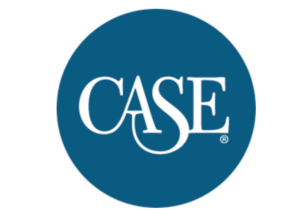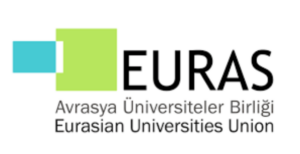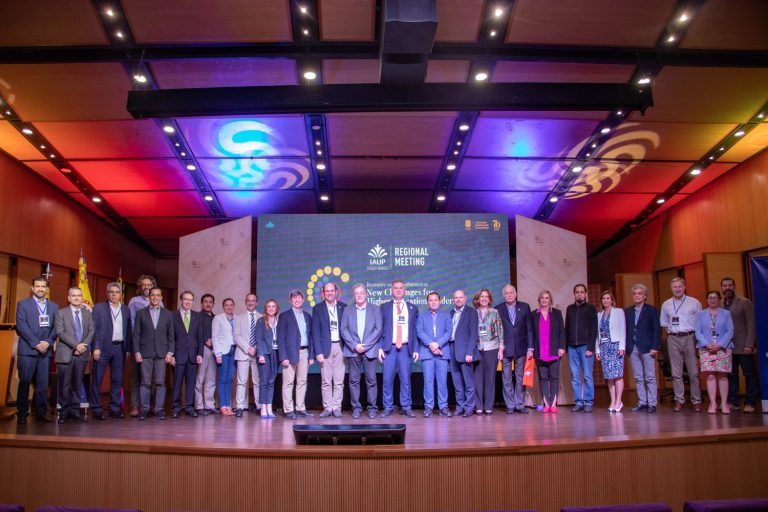
We need to be better, higher quality, responsive, resilient, innovative and inclusive: 2022 IAUP Regional Meeting in Colombia
With in-person and virtual attendees from Mexico, United States, Austria, Costa Rica, Colombia, Spain, France, Chile, United Kingdom, Georgia and Bangladesh, the 2022 IAUP Regional Meeting “Recovery and Transformation: New Challenges for Leaders of Higher Education”, was held successfully at Universidad Autónoma de Bucaramanga (UNAB) in Colombia, from September 28-30, 2022. The program included more than 20 international speakers in six panels and a conference, networking opportunities, and various cultural experiences.
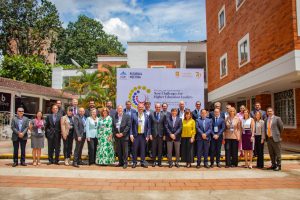
September 29, 2022
The day’s activities began with a welcome message by host Juan Camilo Montoya Bozzi, President of UNAB and IAUP Executive Committee member. In his opening statement, IAUP and CETYS University President Fernando León-García highlighted the ways in which higher education leaders coped with the pandemic. “As leaders we can learn from what is working, notice what is failing, improve where it makes sense to do so, and seek to innovate, as we explore to push the boundaries of what we know. We need to be better, higher quality, responsive, resilient, innovative and inclusive,” he stated.
As leaders we can learn from what is working, notice what is failing, improve where it makes sense to do so, and seek to innovate, as we explore to push the boundaries of what we know. We need to be better, higher quality, responsive, resilient, innovative and inclusive.
The first panel on key leadership challenges for universities after the pandemic, and strategy and design of better, different and resilient institutions, featured León-García and Montoya Bozzi as well as Presidents Tomás Morales, California State University San Bernardino (USA); Elizabeth Stroble, Webster University (USA); and Ignacio Sánchez Díaz, Pontificia Universidad Católica de Chile.
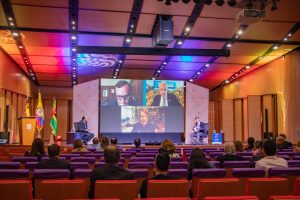
Panel 1: Strategy and Leadership in Higher Education
These leaders exchanged opinions and experiences about the lessons learned during the pandemic, the changes implemented in their institutions, and the sensitive issues that they consider should be given more attention. Solidarity, empathy, innovation and a sense of community were the main points in common.
In the words of President Ignacio Sánchez: “We learned to value the sense of community; we value the interdisciplinary work that led us to think how we could help from all areas of knowledge…Without a doubt, the creativity of our community is great and we learned to listen more and empower different groups”.
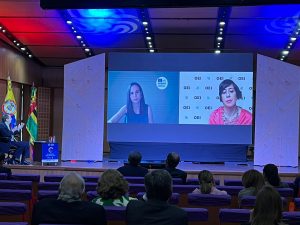
Panel 2: New Ways to Reinvent Higher Education
During the second panel, the central theme addressed new ways of reinventing higher education, with the participation of Dr. Juan Fernando Galván Reula, IAUP Secretary-General (Spain), Dr. Victoria Galán-Muros, Senior Policy Analyst at UNESCO-IESALC (France) and Dr. Ana Capilla Casco, Director of Higher Education and Science at the Organization of Ibero-American States for Education, Science and Culture (Spain).
This discussion focused on the challenges identified by UNESCO for 2030, higher education as a public right and the call for universities to make a transition towards interdisciplinarity, flexibility, skills development and lifelong learning, among other aspects.
In the afternoon, the third session revolved around on how presidents should understand and lead the digital transformation: decisions, phases and best practices, with Dr. Kakha Shengelia, Caucasus University President and IAUP Chairman (Georgia), Dr. Alejandro Caballero, Principal Education Specialist at the International Finance Corporation(USA), Dr. Charles R. Graham, Professor of Instructional Psychology and Technology at Brigham Young University (USA), and Dr. José Mata Temoltzin, President of Universidad Anáhuac Puebla and of the Mexican Federation of Private Institutions of Higher Education (Mexico) as speakers.
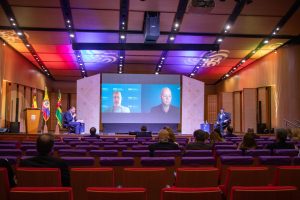
Panel 3: University Presidents Leading and Promoting Digital Transformation
Caballero highlighted that the main focus of transformation is that “universities develop large platforms in student information systems”. Changing business models, student as digital natives, shorter programs and ‘nano-degrees’, as well as faster return on investment, are some of the bases that the world’s universities should look for in the future. “Leaders must not only focus on business, they must think carefully about how to improve the student experience on campus,” added Graham.
Leaders must not only focus on business, they must think carefully about how to improve the student experience on campus
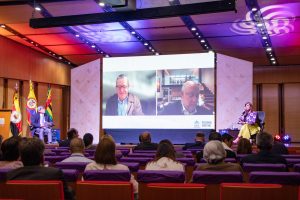
Panel 4: Global Multiversity
The fourth session explored the new roles of universities in facing current human, social and economic challenges, under the concept of the global multiversity in the post-pandemic era. It included participations from President León-García, Dr. Arturo Cherbowski, Executive Director of Santander Universidades and General Director of UNIVERSIA (Mexico), Dr. Fernando Valenzuela Migoya, Global Digital Education Thought Leader (Mexico), and Dr. Maritza Rondón Rangel, President of Universidad Cooperativa de Colombia (Colombia).
Cherbowski stated higher education leaders must be clear on the university’s mission and vision, because transformation will imply an important investment to continue competing at a global scale. In addition, the panel focused on three topics: personalized education, use of technology, and national and international alliances.
“Global education is teaching us that modalities must be prepared for what is happening around the world at an academic level. Institutions cannot continue to think that all first-semester students have the same competencies. If we manage to bring all systems to the level of digital nomads, we will be doing the job well”, said Rondón Rangel.
September 30, 2022
On the second day of the 2022 IAUP Regional Meeting, the main topics of the meetings revolved around global sustainability, transformations in higher education models and prioritization of student well-being and their life projects.
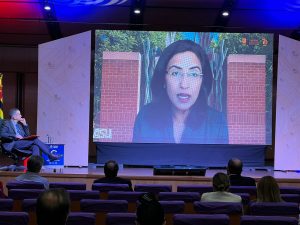
Conference: Reimagine, Redesign and Rebuild Higher Education Institutions for Powerful Social and Economic Impact
In the first conference, Dr. Mine Ipe of Arizona State University (ASU) addressed the topic of reimagining, redesigning, and rebuilding higher education institutions for powerful social and economic impact.
“What do we want to contribute to societies? What can and should we do and what not? How can we create an impact? These are questions that arise from the needs around us. We have to re-imagine ourselves and stop continuing to perpetuate an educational model built 200 years ago that was designed for that time”, said Ipe, while concluding that students should be prepared for life and for roles and jobs that we still do not know.
“What do we want to contribute to societies? What can and should we do and what not? How can we create an impact? These are questions that arise from the needs around us. We have to re-imagine ourselves and stop continuing to perpetuate an educational model built 200 years ago that was designed for that time
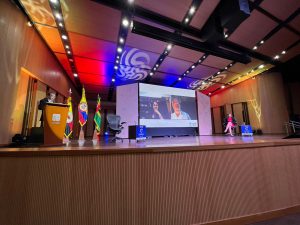
Panel 5: Generating Positive Impact: Research and Community Outreach for Global Sustainability
Next, a panel was held in which Dr. Galván, Dr. Alan Sweedler, Senior Fellow for Energy and Environment at the Center for U.S. – Mexican Studies, University of California (USA), Dr. Andrea Catalina Martínez Lozada, Professor and Researcher at UNAB (Colombia) and Dr. Maryon Urbina, Director of Sustainability, Pontificia Universidad Católica de Chile, talked about how to generate positive impact through research and community outreach to achieve global sustainability.
Speakers shared experiences based on projects carried out in their institutions. All agreed on the importance of creating initiatives that involve communities in order to transform and transfer knowledge.
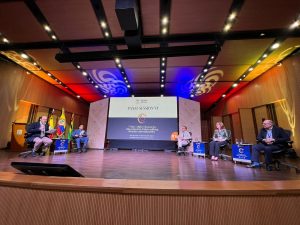
Panel 6: Today’s Higher Education Key Value Proposition: Student Wellbeing, Life Project and Employability
In the last session, speakers discussed the mental health of students, as well as how to support their life projects and drive employability. President Montoya Bozzi, Dr. Sabur Khan, Chairman of Daffodil International University (Bangladesh), Dr. Stephen Williams, Director NTU Global at Nottingham Trent University (UK), Dr. Harold Castilla Devoz (Colombia), Dr. Santiago García Rodríguez, Vice President, Kedge Business School (France) and Dr. Patricia del Pilar Martinez Barrios, General Vice Chancellor of UNIMINUTO University System (Colombia), presented the actions and strategies that are applied at their institutions.
In his closing remarks, President León-García stressed that universities are called to develop adequate platforms for students and ensure that they have the experience regardless of the degree of digitalization of each institution. He highlighted the importance of alliances, leadership and community in the processes of educational transformation. “We must accommodate students, they are constantly changing, as well as the role of universities. You have to be prepared, be proactive,” he said.
We must accommodate students, they are constantly changing, as well as the role of universities. You have to be prepared, be proactive.
View gallery here.


